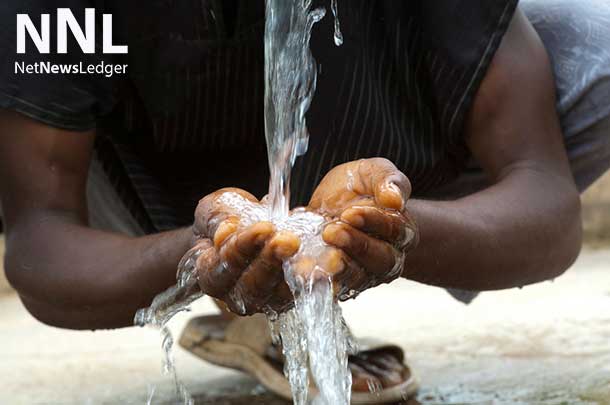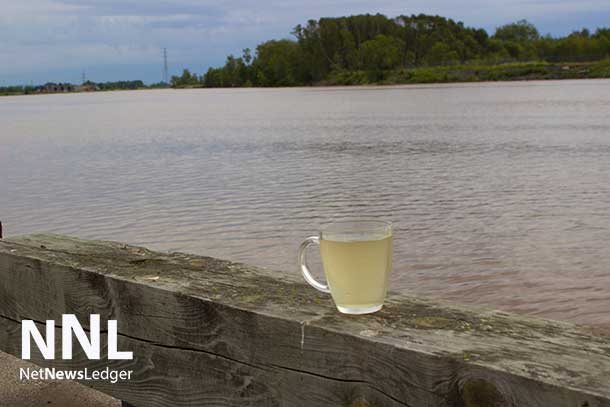
Safe Drinking Water is a Human Right
THUNDER BAY – When you’re low on fluids, the brain triggers the body’s thirst mechanism so you should get yourself a drink of water.
Drinking enough fluids is important when exercising. Cells that don’t maintain their balance of fluids and electrolytes shrivel, which can result in muscle fatigue. When muscle cells don’t have adequate fluids, they don’t work as well and performance can suffer.
Body fluids transport waste products in and out of cells. The main toxin in the body is blood urea nitrogen, a water-soluble waste that is able to pass through the kidneys to be excreted in the urine. Your kidneys make sure to cleanse and rid your body of toxins as long as your intake of fluids is adequate.
When you’re getting enough fluids, urine flows freely, is light in color and free of odor. When you’re not getting enough fluids, urine concentration, color, and odor increases because the kidneys trap extra fluid for bodily functions.
If you chronically drink too little, you may be at higher risk for kidney stones, especially in warm climates.
Dehydration causes headaches, fatigue, and difficulty in concentrating also tasks are more difficult when slightly dehydrated.
The importance of access to fresh clean water is a human right.
This hits hard against Kenyans

For while Kenyans have rights to safe water and sanitation on paper, the reality is that millions do not enjoy these fundamental rights.
“Kenya is in a critical transitional moment for the provision of water and sanitation,” Catarina de Albuquerque, the Special Rapporteur on the human right to safe drinking water and sanitation, said in a statement. “Kenya is often invoked as a model at the international level due to the constitutional recognition of water and sanitation as human rights.
“However, there is still a long way to go to realize the human rights to water and sanitation for all. Much more has to be done to translate the law into reality for the millions of Kenyans for whom these human rights are still only a mirage.”
Following her 22 to 28 July visit, Ms. de Albuquerque urged the Parliament to adopt the Water Bill, and the Government to subsequently develop a new national water and sanitation strategy, which should be translated into real action at the county level.
A news release on the visit noted that only 30 per cent of Kenya’s population has access to improved sanitation, while 13 per cent of people still have no choice but to defecate in the open. “This is a daily indignity for over 6 million people,” said the expert.
In Turkana county, which Ms. de Albuquerque visited during her mission, over 80 per cent of the population practice open defecation.
“This is not only an absolute denial of the right to sanitation, but also a serious threat to public health and the security of women and girls who have to walk into the bush at night. These women and girls are exposed to daily risks due to the lack of proper sanitation,” she stressed.
“Realizing human rights costs money. Without dedicated budgets for sanitation, water and hygiene, the constitutionally recognized rights to water and sanitation will never materialize,” she added.
“By investing in sanitation, Kenya would make significant economic gains,” stated the expert, noting that the country loses at least $330 million every year due to premature death, health care costs and productivity losses resulting from the lack of access to adequate sanitation.
“This is the moment to make it happen. The Kenyan Government must seize the opportunity. The rights to water and sanitation should not remain a dream for so many.
Independent experts or special rapporteurs are appointed by the UN Human Rights Council to examine and report back on a country situation or a specific human rights theme. The positions are honorary and the experts are not UN staff, nor are they paid for their work.
How About Thunder Bay?

I and two others walked along Kam River Park today for a quick look around.
The river had quite a bit of litter floating on the side of it, and the water itself was quite dirty looking. Along one of the grass areas was a syringe just out in the open.
That water flows into Lake Superior, where Thunder Bay draws its drinking water.
We shouldn’t let our past mistakes come to bite us back. The pollution within the lake will undoubtedly become an issue as more and more dangerous pollutants and invasive species attack the lake, because although our city’s water treatment plant is top of the line that doesn’t mean it’s perfect.
The city must work together to clean the gunk out of the river to ensure clean water for ourselves and our children.
Northern Communities run into various problems involving safe drinking water due to pollutants and disease causing organisms.
There are many Northern Ontario communities under water advisories and boil water order.
We should learn from this so our city doesn’t have to boil our water, or not even be able to even use it like many reserves.
Skyler Patayash






